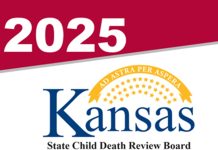The Kansas Senate late Thursday night passed a bill moving the state to a single tax rate, although the price tag ballooned with the help of several floor amendments.
The Senate voted 29-11 to approve the $1.7 billion tax bill with the help of Republican state Sen. Dennis Pyle of Hiawatha flipping sides and Democratic Sen. David Haley of Kansas City saying that he was mistakenly recorded as voting for the bill.
The bill collapses the state’s three tax rates down to one, which would gradually decrease a half percent a year from 5.7% in 2024 to 5.45% in 2029.
It also would increase the personal exemption to $22,000 for a married couple filing jointly from $2,250 for a single person.
The exemption would rise to $11,000 for all other filers. Additionally, filers could claim a $3,000 personal exemption for each dependent.
The bill also would exempt all Social Security income from state taxes and increase the property tax exemption for the 20-mill school tax to $100,000 from about $42,000.
It also would increase the standard deduction for individuals to $4,000 from $3,500 with everyone getting a yearly cost-of-living adjustment starting in 2025.
Pyle has sided with Democratic Gov. Laura Kelly’s tax plan throughout the session but voted for the single-rate tax plan Thursday night.
In an interview, Pyle said he voted for the bill because it had some positive elements such as exempting Social Security taxes.
“I voted for the Social Security and other good components in the bill,” Pyle said. “I’m not a strong supporter of the single rate.”
However, Pyle said he would vote to sustain an expected veto from Kelly, who has been steadfast in her opposition to a flat tax.
“If the governor vetoes the single rate, I’ll sustain the veto,” he said. “There is a lot of politics going on and they’re playing games and trying to get bad votes on all of us.”
Pyle said the bill had a mix of good and bad.
“Let’s see what the House does with it.
“Maybe the House will take the single rate of out of it.”
Meanwhile after the Senate had adjourned, Haley was pleading with the Senate clerk and the Senate president that he actually voted against the bill.
“I reluctantly voted, ‘no,'” Haley said as he sat at his desk in the chamber following Thursday’s session of the Senate, which lasted from 2:30 p.m. until after 10.
“They’re saying that they heard, ‘yes,'” he said. “Everyone seems to have heard I said, ‘yes.’ But ‘yes’ did not come out of my mouth.”
Haley has openly been undecided about how to vote on the tax bill. Asked how he would vote on a potential veto override, Haley said, “Right now, I don’t know.”
The Senate was trying to solve a puzzle over what lawmakers might accept balanced against the governor’s refusal to budge on a flat tax.
The bill built by Republican state Sen. Caryn Tyson, chair of the Senate tax committee, sought to offer something that was not only financially sustainable that would not exclusively benefit affluent taxpayers.
“No one can say that we are helping the rich in this legislation, this is helping the low- and medium-income families and hardworking Kansans,” Tyson said.
Senate President Ty Masterson said he intended for Thursday’s session of the Senate to be an “open forum” on tax policy.
“We had no idea where it was going,” Masterson said.
Masterson said the bill will now head to a conference committee where he wants to find something on which everyone will be comfortable.
Masterson said the bill passed by the Senate is not the final product, adding that he thinks the rate is too high and the fiscal impact needs to be tightened.
Another bill is expected to emerge in the House, maybe as early as next week.
As the bill came out of committee, it would have cost the state about $1.5 billion in revenue over three years. It grew to about $1.7 billion after it was changed on the floor.
Asked about the prospects of holding onto a supermajority, Masterson said, “I feel fairly confident, but in this building, you never know.
“You keep working until you ring out sine die.”
Dinah Sykes, the top Democrat in the Senate, put out an alternative tax plan that would have replaced the flat tax by shaving a tenth of a percentage point off each tax bracket.
Sykes’ plan would have included a child tax credit, eliminated the state income tax on Social Security and increased the standard deduction.
Sykes’ plan would have cost about $1.3 billion over three years. It was defeated on the Senate floor on a 14-26 vote. Haley and Pyle supported Sykes’ plan. The plan also had support from Republican state Sen. John Doll, who voted for the bill that passed.
“This is a good tax plan that will balance and you’re going to have money in the bank,” said Republican state Sen. Rob Olson of Olathe.
“I think the governor will sign this,” he said. “I think this is what your people really want.
“I think this is the way out of here this year,” he said. “If it’s not this bill, it’s going to be something close to it.”
Republican state Sen. Tim Shallenburger, a veteran of statehouse battles over his years in politics, questioned the value of sending the governor another single-rate bill.
“I’m not sure we’re getting very far putting another single rate bill before her,” he said.
“We’re going to try it. We’re going to see what happens,” he said. “I think we’re going to be back here again. I hope at some point in time we can get some kind of compromise.”















